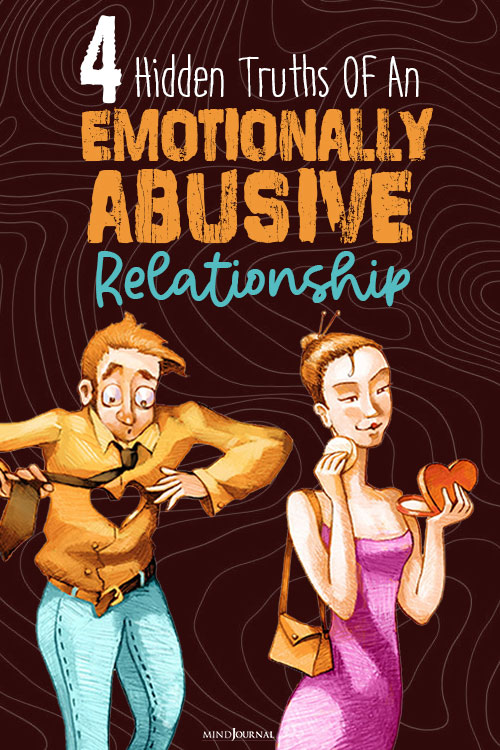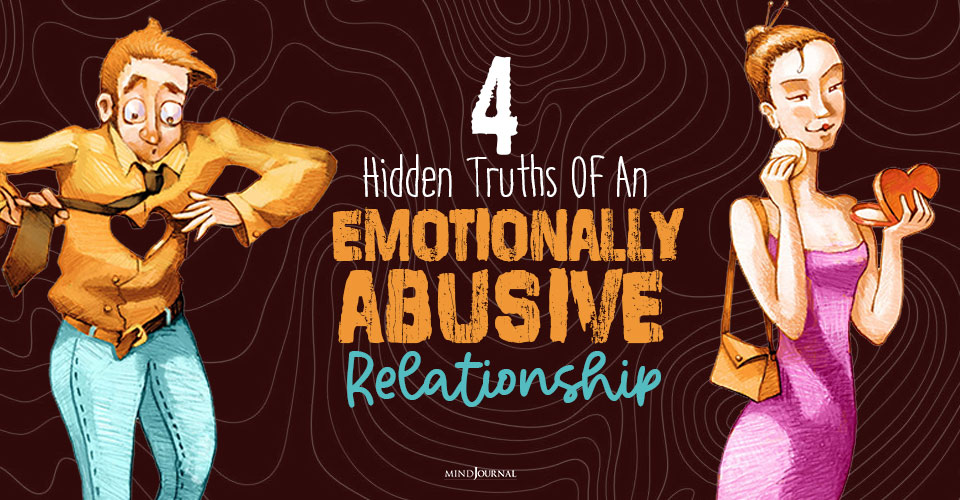Being in an emotionally abusive relationship can drain you emotionally and psychologically, leaving you mentally exhausted. The ongoing cycle of idealization, devaluation, and discard, keeps one wondering if it’s really love? No it’s not. These are simply hidden signs of emotional abuse.
Some people who do not understand the scope of narcissism, mistake it to be a simple flaw and choose to adjust along with it. The bad news is that narcissism is not just a simple flaw, it is a personality disorder.
You might think that a narcissist’s love for you is genuine, but the reality could not be farther from the truth. They will love you and treat you properly as long as it serves their interests. The moment your job is done, they will dismiss you. Selflessness is not something that narcissists believe in.
Related: 20 Narcissistic Abuse Terms: A Glossary of Terms for Understanding Narcissism
Behind Closed Doors: Spotting 4 Hidden Signs Of Emotional Abuse
1. Treating People As Objects And A Means To An End
This is one of the biggest warning signs of an abusive relationship.
Narcissists don’t enter into relationships with the same ideas about love, fairness, thoughts of sharing responsibility, suitability, equality, partnership, etc that normal people think about. Instead, narcissists are very opportunistic, myopic, and selfish.
As long as you can serve the interests of a narcissist, you will be kept in the picture, if you cannot, you are out of it. It is that simple for a narcissist to dispose of people from their lives.
If you ever get into a narcissistic relationship, everything will be fine and perfect in the beginning. With time, you will slowly start to see the signs of control, manipulation, gaslighting, and emotional abuse.
Initially, you might end up dismissing these signs of narcissistic abuse as rough patches or bad days, but with passing time you will realize that the same things are happening over and over again. Narcissistic abuse will make you feel mentally unhappy and unsure of yourself all the time.
In an emotionally abusive relationship, the harsh truth is that you don’t matter, only the narcissist does. No matter how many times they apologize for causing you hurt, they will always go back to their old ways. This is possible only when they see that their victim is constantly forgiving them, no matter what they do.
What further bolsters their overconfidence is the fact that the victim never leaves and chooses to make things “work”. This is heavily exploited by narcissists who continue to use their partners to satisfy their malevolent wishes.

2. Narcissistic Abuse Does Not Believe In Compromise
Compromise is an essential part of a relationship, and at some point or the other everyone compromises in order to maintain a stable and happy relationship.
However, when you are dealing with a narcissist throw the concept of compromise out the window, because they simply do not understand how that works. And even if they do, they couldn’t care less about it.
Narcissists do not believe in compromising because why should they? Compromising means they might have to sacrifice their wants or put them on the back burner and prioritize the other person’s needs. A situation like this is an absolute no-no for a narcissist.
When you’re a person who wants to share love, comfort, peace, and closeness with your partner but realize that they are hell-bent on power and cannot compromise at all, it can take a toll on your relationship.
Narcissistic abuse can be characterized by destroying opportunities for intimacy by bringing up old issues, power struggles, and the negative things other people say about you.
This leads to a heartbreaking realization that you’re in an emotionally abusive relationship with someone who will likely NEVER be able to connect on the levels that we all desire in intimate relationships.
In no way does a narcissist believe in making the other person feel good, apart from the times when they need something from them. If a narcissist needs something from you, they will compliment you, make you feel special, and make sure that you feel positive all the time with them.
But as soon as their job is done, the feel-good factor is gone, the sweet demeanor is gone and so is the positivity.
A narcissistic relationship can lead you to have anxiety, depression, low self-confidence, and immense amounts of self-doubt because, without all this, a narcissist can never be able to manipulate you to their heart’s content.
Related: 8 Mental Abuse Tactics To Watch Out For
3. Honesty Without Trust Has No Value
Trusting narcissists can be one of the toughest things you can do in a relationship because almost all they do is lie. No matter what you say or ask them, they will always have a lie on the tip of their tongue. They will be “honest” with you and not be honest at the same time.
Ever delusional in their psyches, they figure if they can CONTROL the truth from seeing the light of day if they can keep prisoners from speaking up then they can control reality.
In such a situation, how is it possible for you to trust someone who lies so easily and openly? The funny part is, if you confront them with this, they will give you a hundred excuses as to why they said what they said.
One of the subtle signs of emotional abuse, they will manipulate the situation and somehow convince you of their innocence and why they are right. If you somehow end up believing him, then well and good but if you do not, then you are “crazy”, “suspicious”, “overbearing”, “nagging” and whatnot.
Manipulating and undermining people is what a narcissist does best, and that is why being in an emotionally abusive relationship can severely affect your mental health.
4. Genuine Love Can Never Abuse You
The difference between being in an emotionally abusive relationship and a normal relationship is simple: a person who genuinely loves you and understands you will never abuse you in any form or the other. Love can never mean abuse but a narcissistic relationship definitely can.
Emotional abuse is a part of a narcissist’s repertoire and is one of their biggest and most powerful weapons, and is one of the most dangerous warning signs of an abusive relationship. The only way they can get what they want is by emotionally and mentally abusing you, to the point that you submit yourself to them completely.
Love does not mean to lie to, lie about, lie to cover up, lie to frame people, lie to get away with, and otherwise deceive and con people that deserve your transparency and honesty.
It is not just a simple mistake, that a man or woman fails to mention that they had unprotected sex with numerous other people outside of their marriage, but rather a horrible way of disrespecting your spouse.
Love is not constantly telling your partner that he/she is worthless or useless or how they are only good for sexual satisfaction or how they should just kill themselves. Going through such horrific mental torture can permanently change a person’s mindset and how they perceive themselves.
When we are stuck in the vacuous world of narcissists, we can’t see the abuse for what it is. We call it love and we try to get back to the positive feelings that they made us feel.
We try harder, making ourselves more vulnerable, more patient, more understanding, but the narcissist just reads that we’re available to take more supply from; certainly nothing more – the more we let them use and abuse us, they view it as tacit approval to continue to abuse us, and if we stay, that is what they will do.
Have you noticed any of these hidden signs of emotional abuse in your relationship? Do you think these subtle signs of emotional abuse exists in your world? Let us know your thoughts in the comments down below!














Leave a Reply